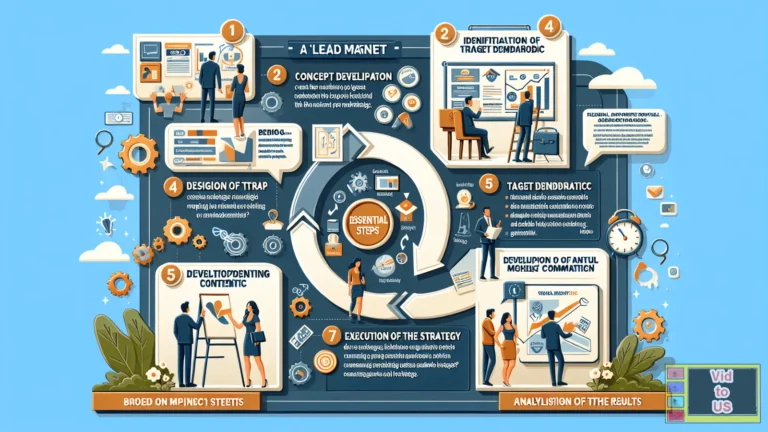Leveraging Technology to Drive Sales Success in Marketing

Table of Contents Leveraging Technology to Drive Sales Success in Marketing
In the fast-paced world of online marketing, staying ahead of the curve is essential for businesses looking to drive sales success.
Leveraging Technology to Drive Sales Success in Marketing has become a game-changer in this digital landscape, offering innovative tools and strategies that can revolutionize the way companies connect with their target audience.
Imagine harnessing the power of cutting-edge data analytics, artificial intelligence, and automation to create personalized campaigns that speak directly to each customer’s needs and preferences.
This isn’t just a dream—it’s the exciting reality of how technology is transforming online marketing into a dynamic arena where creativity meets efficiency.
With the rise of e-commerce and social media platforms, businesses now have unprecedented opportunities to reach global audiences and make an impact like never before.
By embracing these technological advancements, companies can unlock new avenues for engagement, conversion, and ultimately driving sales growth.
From social listening tools that provide real-time insights into consumer behavior to AI-powered chatbots that deliver instant customer support—there’s no limit to what technology can do to elevate your online marketing game.
Join us on a journey through the realm of possibilities as we explore how leveraging technology is not just an option but a necessity for any business striving for sales success in today’s competitive digital marketplace.
Utilizing digital platforms for lead generation
In today’s highly competitive online marketing landscape, businesses are constantly seeking innovative ways to generate leads and drive sales success.
One strategy that has proven to be highly effective is the utilization of digital platforms for lead generation.
With the advent of social media, search engines, and email marketing, businesses now have access to a vast pool of potential customers at their fingertips.
By leveraging these digital platforms, businesses can strategically target their ideal audience, engage with them through compelling content and offers, and ultimately convert them into loyal customers.
Moreover, the use of data analytics and automation tools allows businesses to track and optimize their lead generation efforts, ensuring a higher return on investment.
Overall, the utilization of digital platforms for lead generation is an essential component of a successful online marketing strategy in today’s tech-driven world.
Maximizing ROI with targeted ads
One powerful tactic to maximize return on investment (ROI) in online marketing is through the strategic use of targeted ads.
By precisely identifying and reaching out to the most relevant and interested audience segments, businesses can significantly increase their chances of converting leads into customers.
Targeted ads allow for precise customization of messaging, tailoring it to resonate with specific demographics, interests, and behaviors.
This level of personalization not only enhances the overall user experience but also increases the likelihood of driving engagement and conversions.
Additionally, the use of advanced analytics and tracking tools enables businesses to measure the effectiveness of their ad campaigns, identify areas for improvement, and optimize their marketing efforts accordingly.
By leveraging targeted ads, businesses can optimize their marketing budget and achieve a higher ROI in their online marketing initiatives.
Enhancing customer engagement through automation
Automation plays a crucial role in enhancing customer engagement in online marketing.
By leveraging technology to streamline processes and deliver personalized experiences, businesses can effectively nurture and engage with their customer base.
Automated email campaigns, for example, allow for timely and tailored communication, delivering relevant content and offers based on customer preferences and behaviors.
This not only saves time and resources but also ensures that customers receive the right message at the right time, increasing the likelihood of conversions and long-term loyalty.
Furthermore, automation can be applied to customer support, providing instant responses and solutions to inquiries, improving satisfaction levels and overall customer experience.
By embracing automation, businesses can efficiently engage with their customers, foster stronger relationships, and ultimately drive sales success in the dynamic landscape of online marketing.
Analyzing data for strategic decision-making
In the realm of online marketing, analyzing data plays a crucial role in making informed and strategic decisions.
By thoroughly examining and interpreting data, businesses can gain valuable insights into consumer behavior, market trends, and campaign effectiveness.
These insights enable organizations to identify areas of improvement, optimize marketing strategies, and allocate resources effectively.
Data analysis allows for the identification of key performance indicators (KPIs) and the tracking of progress towards achieving business goals.
Whether it is analyzing website traffic, conversion rates, or social media engagement, data-driven decision- making empowers businesses to make informed choices that drive sales success in the ever-evolving landscape of online marketing.
Streamlining sales processes with technology
With the rapid advancement of technology, businesses have the opportunity to streamline their sales processes and drive sales success in online marketing.
By leveraging technology tools and platforms, organizations can optimize their sales operations, enhance efficiency, and improve customer experiences.
For instance, customer relationship management (CRM) systems offer a centralized database that enables sales teams to track customer interactions, manage leads, and monitor sales pipelines.
Additionally, automation tools can streamline repetitive tasks such as email marketing campaigns, lead nurturing, and follow-ups, allowing sales professionals to focus on building relationships and closing deals.
Moreover, advanced analytics and reporting capabilities provide real-time insights into sales performance, enabling businesses to identify trends, spot opportunities, and make data-driven decisions.
By harnessing the power of technology, businesses can revolutionize their sales processes, drive growth, and stay ahead in the competitive landscape of online marketing.
In today’s digital age, it is crucial for businesses to stay ahead of the curve and utilize technology to drive sales success in online marketing.
By leveraging tools and strategies such as data analytics, social media advertising, and personalized content, companies can effectively reach and engage with their target audience, ultimately leading to increased sales and revenue.
It is clear that technology is a powerful tool in the world of online marketing, and businesses that embrace and adapt to it will have a competitive edge in the market.
So let’s embrace the power of technology and use it to drive our sales success in the ever-evolving world of online marketing.
FAQ
How can businesses effectively utilize data analytics to optimize their online marketing strategies and drive sales success?
Businesses can effectively utilize data analytics by collecting and analyzing customer data to understand their behavior and preferences.
This information can inform targeted marketing campaigns, personalized content, and optimized advertising strategies.
By leveraging data analytics, businesses can make data-driven decisions, track key performance indicators, and continuously refine their online marketing efforts to drive sales success and improve customer engagement.
What role does artificial intelligence play in improving customer targeting and personalization in online marketing?
Artificial intelligence plays a crucial role in enhancing customer targeting and personalization in online marketing by analyzing vast amounts of data to predict consumer behavior, preferences, and purchasing patterns.
Through AI algorithms, businesses can create more targeted and personalized marketing campaigns, recommend products based on individual preferences, and deliver tailored content to customers, leading to higher engagement, conversion rates, and overall customer satisfaction.
AI enables marketers to understand and respond to customer needs more effectively, ultimately driving better results and enhancing the overall customer experience in the online space.
How can businesses leverage social media platforms and influencer marketing to boost sales and drive online revenue?
Businesses can leverage social media platforms by collaborating with influencers who have a strong online presence and engage with their target audience.
By partnering with influencers, businesses can reach a wider audience, increase brand awareness, and drive traffic to their websites or online stores.
Creating engaging content, running promotions or discounts through social media channels, and actively engaging with customers can also help businesses boost sales and drive online revenue through social media platforms.
Consistent monitoring and analysis of social media strategies can further help in optimizing the approach for maximum impact.
What are some key trends in e-commerce technology that businesses should be aware of in order to stay ahead of the competition?
Some key trends in e-commerce technology that businesses should be aware of include the rise of mobile commerce, the importance of personalization and AI-driven recommendations, the integration of social commerce, the growth of voice commerce through smart assistants, the emphasis on sustainability and
ethical practices, and the increasing use of augmented reality for enhancing the shopping experience.
By staying abreast of these trends and leveraging them effectively, businesses can stay ahead of the competition and provide a seamless and innovative shopping experience for their customers.
How can businesses integrate automation tools and chatbots into their online marketing efforts to enhance customer engagement and increase sales conversions?
Businesses can integrate automation tools and chatbots into their online marketing efforts by using chatbots to provide immediate customer service, personalized recommendations, and assistance throughout the customer journey.
Automation tools can streamline processes like lead nurturing, email marketing, and social media management to enhance customer engagement.
By leveraging these technologies, businesses can create a seamless and interactive experience for customers, leading to increased sales conversions through targeted messaging, efficient communication, and better overall customer satisfaction.






